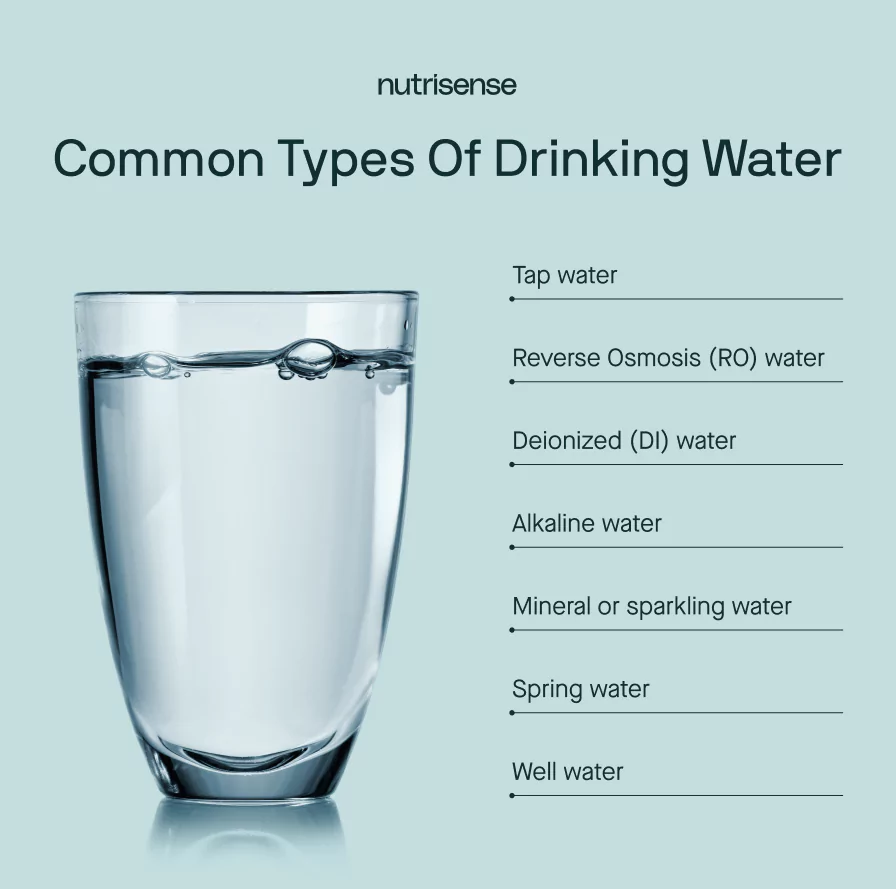In the quest for optimal health, we often explore countless diets, exercise routines, and wellness trends. However, there is one fundamental element that is often overlooked: water. As we all know, water is essential for our bodies, but have you ever wondered what the healthiest water to drink is? In this article, we will shed light on this important question and discuss various factors that influence the quality of our drinking water. So, grab a glass of your favorite water, and let’s uncover the secrets to staying hydrated and healthy.
Understanding Water Quality
Water is essential for our survival, and its quality plays a vital role in maintaining our overall health and well-being. Understanding water quality can help us make informed choices about the water we drink. In this article, we will explore the importance of water quality, factors affecting it, and the different types of water available.
Importance of Water Quality
Water quality is crucial because it directly affects our health. Drinking contaminated water can lead to various waterborne diseases, such as diarrhea, cholera, and typhoid. On the other hand, consuming clean and safe water helps prevent these illnesses and promotes overall hydration. Furthermore, quality water is essential for the proper functioning of our organs, maintaining a healthy weight, and enhancing our skin’s appearance.
Factors Affecting Water Quality
Numerous factors affect water quality, including the source of the water, the treatment process it undergoes, and any potential contaminants it may contain. The presence of pollutants, such as heavy metals, pesticides, bacteria, and viruses, significantly impacts water quality. Additionally, factors like pH levels, hardness, and mineral content also contribute to the overall quality of the water.
Different Types of Water
There are several types of water available to us, each with its own characteristics and properties. Let’s explore some common types of water, including tap water, bottled water, mineral water, spring water, distilled water, alkaline water, filtered water, and carbonated water. Understanding the differences between these types of water can help us make informed decisions about what we consume.
Tap Water
Source of Tap Water
Tap water is supplied to our homes through a system of pipes connected to a municipal water supply. It is typically sourced from rivers, lakes, reservoirs, or underground sources like wells. The sources may vary depending on the location.
Water Treatment
Before reaching our taps, tap water undergoes an extensive treatment process to make it safe for consumption. This treatment typically involves processes like coagulation, sedimentation, filtration, and disinfection. These steps help remove impurities, such as sediment, bacteria, viruses, and harmful chemicals, ensuring that the water meets regulatory standards.
Contaminants in Tap Water
Despite the treatment processes, tap water may still contain certain contaminants, such as chlorine, lead, pesticides, and pharmaceutical residues. The levels of these contaminants may vary depending on the location and quality of the water source.
Pros and Cons of Tap Water
One of the significant advantages of tap water is its affordability and accessibility. It is usually a cost-effective option, as it is readily available through our taps. Tap water also goes through rigorous testing and regulation to ensure safety and quality. However, potential concerns may arise due to the presence of certain contaminants or personal preferences for taste and odor. It is important to stay informed and take necessary precautions, such as using water filters if desired.


This image is property of assets.nutrisense.io.
Bottled Water
Common Sources of Bottled Water
Bottled water comes from various sources, such as natural springs, underground wells, or public water supplies. The labels on bottled water products usually indicate the source of the water, allowing consumers to choose based on their preferences.
Water Treatment Process
Bottled water undergoes a specific treatment process to ensure that it is safe and meets regulatory standards. The treatment process may involve filtration, disinfection, and other purification methods, depending on the source and the brand.
Controversies Surrounding Bottled Water
Bottled water has faced several controversies over the years. One concern is the environmental impact of the production and disposal of plastic bottles. The excessive use of plastic contributes to pollution and waste management issues. Additionally, some studies have found that bottled water may not always be superior to tap water in terms of quality, raising questions about its necessity for daily consumption.
Environmental Impact
As mentioned earlier, the production and disposal of plastic bottles used for bottled water contribute to environmental pollution. Many plastic bottles end up in landfills and oceans, posing a threat to wildlife and ecosystems. Choosing reusable water bottles or opting for alternative water sources may help minimize the environmental impact.
Pros and Cons of Bottled Water
Bottled water provides convenience and portability, making it a popular choice for people on-the-go. It often comes in various sizes and formats, catering to different needs. Furthermore, certain brands may offer unique types of water, such as mineral water or alkaline water. However, the cost of bottled water can add up over time, and concerns about its environmental impact and potential for quality inconsistencies exist. It is important to evaluate individual needs and circumstances when considering bottled water as an option.
Mineral Water
Natural Source of Mineral Water
Mineral water is sourced from natural springs or wells and contains minerals and trace elements that are beneficial for health. The water obtains these minerals as it passes through rocks and soil, giving it its unique properties.
Mineral Content
Mineral water contains various minerals like calcium, magnesium, potassium, and bicarbonate. The exact mineral composition may vary depending on the source. These minerals are naturally present in the water and can contribute to its taste and potential health benefits.
Potential Health Benefits
Drinking mineral water has been associated with potential health benefits. The minerals present in this type of water can support the body’s mineral balance, contribute to bone health, and aid in digestion. Some mineral waters are also known for their natural alkalinity, which may help neutralize acid in the body.
Considerations for Drinking Mineral Water
While mineral water can provide essential minerals and potential health benefits, it is important to consider individual dietary needs and the mineral content of the water. Some people may already obtain sufficient minerals through their diet, while others may require additional supplementation. Monitoring mineral intake and consulting with a healthcare professional can help ensure proper balance and avoid any potential health risks associated with excessive mineral consumption.


This image is property of i.ytimg.com.
Spring Water
Origin and Characteristics of Spring Water
Spring water comes from natural springs, which are formed when groundwater emerges naturally from the earth’s surface. It is known for its purity and refreshing taste, making it a popular choice among consumers.
Regulations for Spring Water
Spring water is subject to regulations to ensure its safety and quality. The U.S. Food and Drug Administration (FDA) has established standards for spring water labeling, requiring that it meets specific criteria regarding its source and treatment.
Benefits of Drinking Spring Water
Spring water is often regarded as a reliable and refreshing source of hydration. Its natural purity and mineral content can contribute to overall well-being, providing essential hydration while potentially offering additional health benefits. The taste and freshness of spring water can also make it an enjoyable choice for many.
Factors to Consider when Choosing Spring Water
When choosing spring water, it is important to consider factors like the source of the water, its mineral content, and compliance with regulatory standards. Reading labels and understanding the specific characteristics of different brands can help make an informed decision based on individual preferences and requirements.
Distilled Water
Process of Distillation
Distilled water is produced through the process of distillation, where water is heated to create steam. The steam is then collected and cooled, leaving behind impurities and resulting in purified water.
Removal of Impurities
Distillation effectively removes impurities from water, including minerals, chemicals, and microorganisms. The process relies on the principle that most contaminants have higher boiling points than water, allowing for their separation.
Uses for Distilled Water
Distilled water is commonly used in various applications, such as laboratory experiments, medical procedures, and automotive cooling systems. It is often preferred in these situations because of its purity and lack of impurities.
Safety Concerns and Considerations
While distilled water is pure and free from impurities, it does not contain minerals or other beneficial elements. It is important to consider individual dietary needs and potential mineral deficiencies when choosing distilled water for everyday consumption. Regularly consuming only distilled water may not provide the necessary minerals and could potentially lead to imbalances in the body.


This image is property of assets.entail.ai.
Alkaline Water
Defining Alkaline Water
Alkaline water is water that has a higher pH level than regular tap water. It is commonly believed to help neutralize acid in the body and promote a more alkaline environment.
Alkaline Water and pH Levels
The pH scale measures the acidity or alkalinity of a substance. Regular tap water typically has a neutral pH of around 7, while alkaline water may have a pH of 8 or higher. The higher pH of alkaline water is attributed to the presence of minerals like calcium, potassium, and magnesium.
Potential Health Benefits
Proponents of alkaline water claim that it can have various health benefits, such as neutralizing acid in the body, improving hydration, and aiding digestion. However, scientific research on these claims is limited, and more studies are needed to fully understand the potential benefits of alkaline water.
Feasibility and Considerations
While alkaline water may have its advocates, it is essential to consider personal preferences, individual health needs, and the availability of alkaline water in the market. Some people may find a higher pH water appealing, while others may not notice any significant difference. It is important to evaluate the feasibility and convenience of incorporating alkaline water into one’s daily routine.
Filtered Water
Different Types of Water Filters
Water filters come in various types, each designed to remove specific contaminants. Some common types of filters include activated carbon filters, reverse osmosis filters, and ultraviolet disinfection filters. These filters vary in their filtration methods and the contaminants they target.
Removal of Contaminants
Water filters effectively remove contaminants like chlorine, sediment, lead, and certain bacteria and viruses, depending on the type of filter. This process helps improve the taste, odor, and quality of the water.
Benefits of Drinking Filtered Water
Drinking filtered water offers several benefits. It can remove unwanted impurities and improve the taste and clarity of the water. Filtering water at home allows for more control over the quality and provides reassurance about the water’s safety for consumption.
Cost and Maintenance Considerations
The cost and maintenance of water filters vary depending on the type and brand. Some filters require regular replacement of filter cartridges, while others may require occasional maintenance. It is important to consider the long-term costs and maintenance requirements when selecting a water filter system that suits individual needs and preferences.


This image is property of www.thespruceeats.com.
Carbonated Water
Introduction to Carbonated Water
Carbonated water, also known as sparkling water or fizzy water, is water that has been infused with carbon dioxide gas. This process creates the characteristic bubbles and effervescence commonly found in carbonated beverages.
Natural and Artificial Carbonation
Carbonated water can be naturally carbonated from underground springs or artificially carbonated by adding carbon dioxide to still water. Natural carbonation occurs when naturally occurring CO2 dissolves in groundwater, resulting in naturally bubbly water.
Effects on Digestion
Some people find that carbonated water can help alleviate symptoms of indigestion and improve digestion. The carbonation and bubbles may stimulate the secretion of digestive enzymes and provide relief from gas or bloating.
Potential Dental Concerns
Carbonated water has been associated with potential dental concerns due to its acidity. However, the carbonation itself does not directly cause tooth decay. It is the added flavors, sugars, or acids in some carbonated beverages that can contribute to dental problems.
Choosing Healthy Carbonated Water
To make a healthier choice when opting for carbonated water, it is advisable to choose plain carbonated water without added sugars, flavors, or acids. Choosing carbonated water with natural carbonation or making your own carbonated water with a home carbonation device can provide a healthier alternative to sugary carbonated drinks.
Conclusion
The importance of water quality cannot be overstated. Hydration is fundamental to our well-being, and choosing the right type of water is crucial for maintaining good health. Understanding the different types of water, their sources, treatment processes, and potential benefits and drawbacks can empower us to make informed choices about the water we consume. Whether it’s tap water, bottled water, mineral water, spring water, distilled water, alkaline water, filtered water, or carbonated water, considering our individual needs, preferences, and the environmental impact can help us make healthier choices for ourselves and the planet. Stay hydrated and choose healthy water options for a happier and healthier life.


This image is property of i.ytimg.com.




